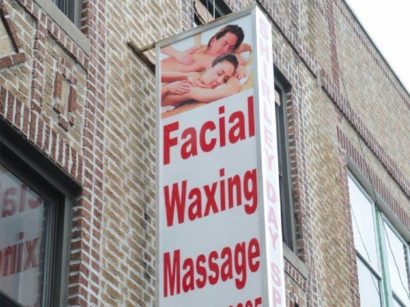Stand Up for Powerless Women: Advocates for Sex Trafficking Victims Are Few and Far Between
by Heather Robinson


March 8 is United Nations-designated International Women’s Day, which has roots in the fight for better and safer working conditions in the U.S. This year, many global corporations are marking the day with events celebrating women’s education and parity in the workplace.
While many professional women are exalted, let’s consider thousands who aren’t, including those who are commercially sexually exploited and trafficked right here in New York City.
The charging of New England Patriots owner Robert Kraft with two misdemeanor counts of soliciting prostitution after twice visiting a Jupiter, Fla. “rub and tug” massage parlor shone a bright light on a world of commercial sexual exploitation. Astoundingly, according to the anti-trafficking group Polaris, the U.S. is home to some 9,000 such establishments, and experts say many of the women who staff them are exploited and trafficked.
The U.S. Department of Homeland Security defines human trafficking as modern-day slavery involving use of force, fraud or coercion to obtain labor or commercial sex acts.
That’s what’s happening in many massage parlors across the U.S., says Irina Tsukerman, a New York-based human rights attorney. “There’s no way to know without investigation whether a place is legitimate, or if someone is a trafficking victim in any individual case, [but] absolutely, a lot of them have been abused and deceived.”
The #MeToo and #TimesUp movements raised awareness of sexual harassment in Hollywood and beyond. But the outrage for women on the lowest rungs of the economic and educational ladder is far harder to find.
Shandra Woworuntu of Queens-based Mentari USA, who is dedicated to helping women escape commercial sexual exploitation (advocates reject words like “prostitution” as dehumanizing), and receive job training, survived the massage parlor underworld herself.
Trafficked at age 24 from Indonesia with the promise of a job in the hotel industry, Woworuntu was held at gunpoint and sexually trafficked in “many places up and down I-95.”
Woworuntu says that while not all women staffing Asian massage parlors are trafficking victims, she estimates about “90%” of those in these places are “coerced.” Some, she says, are “doing survival sex” — meaning they have no other option.
“Sometimes they are threatened when they try to get out,” she adds. “Men, you don’t know the woman you are buying…It’s not a happy ending for [her.]”
Others concur that International Women’s Day and the Kraft case present an opportunity to raise men’s consciousness.
“We need to take advantage of this ‘teachable moment,’ ” said Dorchen Leidholdt, attorney and co-chair of the New York Anti-Trafficking Coalition, a network of 140 organizations working to combat commercial sexual exploitation and trafficking. She has represented more than 400 East Asian women who were coerced into illegitimate work in massage parlors. She says these mostly Chinese and Korean women “are told it will be legitimate massage and then customers and brothel owners pressure and sometimes force them” into sex work. In many cases they are trafficked by organized crime syndicates who move them from New York to other areas of the U.S., experts say.
The picture is complicated by financial challenges, lack of social support and lack of English-speaking skills, according to Susan Liu, whose New York-based organization, Garden of Hope, assists mostly Chinese-speaking women who have survived gender-based violence, including trafficking.
Women have achieved phenomenal advances in fields like politics, education, medicine, business and the arts. But this International Women’s Day, before we pat ourselves on the backs, let’s realize that when certain women are still viewed and treated solely as objects of sexual gratification, we have a long way to go toward a world where women have achieved equality.
This entry was written by Heather Robinson and posted on March 9, 2019 at 10:47 am and filed under Commentary. permalink. Follow any comments here with the RSS feed for this post. Keywords: . Post a comment or leave a trackback: Trackback URL. */?>



